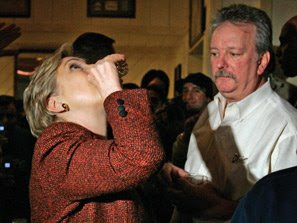Maybe it was Pennsylvania. Ahhh!!! Yes, here it is:

Anyways, I got to thinking. Why would anyone question why the Vice President would be at the Beer Summit? I mean, it's Joey B., for Christ's sake. It wouldn't really be a Beer Summit without him.
Come to think of it, I think that the Beer Summit should be a widely implemented practice (A best practice, if you will) thoughout Corporate America. I think that colleagues should hold weekly, no, thrice-weekly, Beer Summits. This would improve employee morale, and thereby improve productivity. I'm being serious. There's no miscommunication, rivalry, or even hatred that a couple cold ones can't cure. Hell, I'll even pick up the tab for the pretzels.
So....What is an externality, you ask? Let's say that my brother is a resident of the state of Ohio. And in the state of Ohio there exists a car manufacturer about 25 miles downstream from where my brother lives. I happen to live in the Great, Good, and Benevolent Commonwealth of Virginia (Where on Earth else would I live?) I decide to buy a car from the Ohio manufacturer. So, I give the car company $25,000 and the car company gives me a car. Done. Right?
Not exactly. As a result of the manufacturing of that car, chemical waste makes it's way in to the stream and makes its way down to my brother's neighborhood. In addition, the air pollution emitted from the car company's smokestacks spreads throughout the neighboring counties. Those aspects of the transaction have a negative impact on my brother. But why should my brother be impacted by the transaction at all when he was not a party to it in the first place? Well, according to the basic tenets of capitalism, he shouldn't be. (And don't you dare tell me that he can pack up and move. Follow that argument down the path a couple steps. Pretty soon, nobody has any place to live).
What I have just described is called an externality. There will always be externalities associated with many, many, many economic activities. And that, my friends, is why no country in the world will ever have a 100% capitalist, perfectly free market. Look it up in the Index of Economic Feedom. Such a thing does not exist. Nor has it ever existed. Sorry, my RLC (Republican, Libertatarian, Conservative) Friends. It's just never gonna happen.
So, what does all of this have to do with Health Care? Well, besides the fact that the consumption of hard liquor does serious damage to one's liver (this means you, Hillary!), I will attempt to provide that answer in my next post.
Enjoy your beers.

